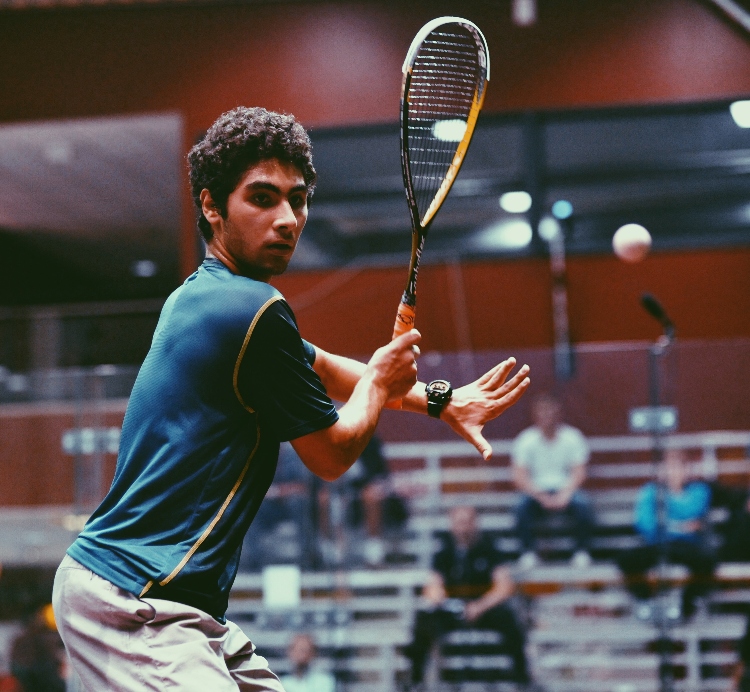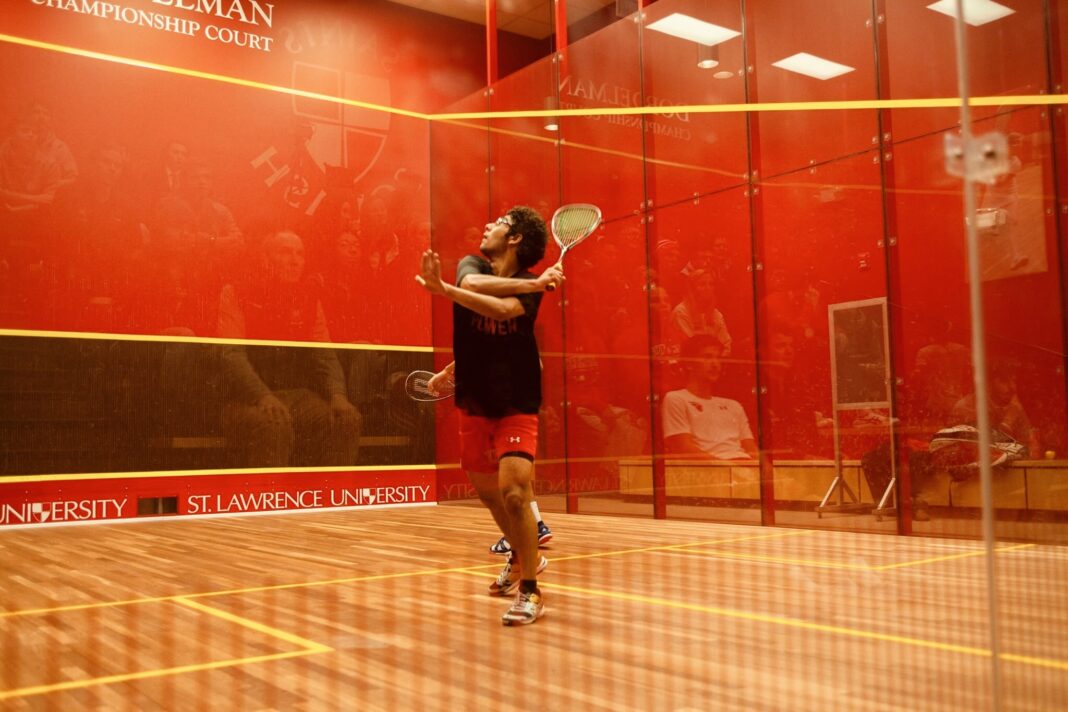Heart pounding, I gripped my racquet tightly as I faced my opponent across the court, the full awareness that this match would redefine my understanding of resilience reverberating across my mind.
The day was 2 May 2014, forever etching itself as an unforgettable match in my memories — and the greatest comeback I had ever made, rallying from a 10-4 deficit in the final game at the Egyptian Nationals Open.
When I finally clinched victory, it dawned on me that giving up was not an option in many aspects of life. That day, squash taught me a powerful lesson: persistence pays off.
For 18 years, squash was a profound and audible mentor in my life, illustrating the complexities of relationships and reinforcing the well-known notion of pushing yourself just a little further, regardless of the challenges. Each game has not only sharpened my skills on the court, but has also instilled a mindset of determination and grit that I carry into the everyday.
Rediscovering Passion Through Squash
My squash journey began at six, spurred by my mother’s encouragement after I had explored sports like taekwondo, swimming, and football. While I enjoyed those activities, none resonated with me like squash, whose vibrant complexity and joy set it apart. It quickly became a steadfast companion and a vessel for personal growth.

I vividly recall my first moment on the court—the intoxicating echo of the ball against the walls and the scent of polished wood. Excitement mingled with apprehension as I gripped the racquet in my small hands. My initial attempts were clumsy, filled with missed shots, but each moment felt like a step toward uncovering a new part of myself.
I remember my coach’s laughter as I fumbled through drills, but the euphoric connection of ball to racquet, even when my aim faltered, kept me motivated. Through practice, I began to grasp the game’s rhythm, balancing offense and defense.
My initial inspiration was sparked from Ahmed Barada, a remarkable former squash player who later transitioned into acting. His success and charisma motivated me to explore the world of squash. I vividly remember watching one time his World Tour final in 2000 on television, and during that match against World Number 2 Peter Nicol, he instantly became my hero.
Another significant influence on my journey has been former Egyptian player Amr Shabana, a true icon in the squash community. His achievements showed that greatness in squash can be pursued at any stage of life, inspiring me to believe that with dedication and hard work, I could reach my goals.
Both Shabana and Barada were known for having insane racquet skills that overwhelmed any opponent; Shabana was even nicknamed ‘The Maestro’ as he beautifully composed himself on court while hitting unbelievable dropshots from nearly everywhere on court.
The Learning Curve
Mastering squash was no easy feat.
I faced numerous challenges along the way, from the frustration and anxiety during matches that made me miss crucial shots to the sting of losing close matches.
Each loss was a lesson in disguise, reminding me that growth often comes through struggle no matter how long it takes.

I can still recall the day I lost a match I believed I could win after being 2/0 up in games and 9-6 in the last game before losing 3/2. I left the court feeling defeated, the weight of disappointment heavy in my chest.
That loss taught me more than any victory could, igniting a fire within me and fueling my determination to analyze my weaknesses and improve.
On the other hand, small victories, like finally executing a well-placed shot or winning a friendly game, fueled my determination and taught me the value of responsibility and resilience.
My practice sessions then became a sanctuary where I could escape from the pressures of life and focus solely on refining my skills.
A Defining Match For Personal Growth
One match stands out in particular—a pivotal moment that tested my limits and taught me about perseverance and sportsmanship. The atmosphere was electric, filled with cheers and tension. The match was my first ever final at the US Junior Open in 2013.
As I battled against Egypt’s number 2 seed, clearly a fierce opponent, I felt a bit of pressure.
As the match wore on, the exhaustion caught up with me in the second game.
Moreover, the emotional rollercoaster of that match was overwhelming, as the referee’s poor decisions unnerved me. I vividly remember the moment I secured a match point, a wave of relief washing over me as I realized I had fought through my tiredness.
I was not able to win this match in the end, as I lost 3/1 and finished second in the tournament.
While it felt heartbreaking at the time, this loss ultimately opened the door to a full scholarship at one of the most prestigious boarding schools in the United States. Following the match, I was scouted and offered a full-ride scholarship that I had never dreamed of.
This opportunity later paved the way for my acceptance into college, where I pursued a bachelor’s degree in political science.
In hindsight, would it have mattered if I had won or lost that match? I don’t believe so, as it still led me to where I am today.
The Community Aspect
Through squash, I forged meaningful relationships with coaches, teammates, and rivals alike. The camaraderie within the squash community became a source of support and encouragement.
The camaraderie was evident when I played college squash in the United States. I recall moments of shared laughter with my teammates after tough matches; we were all quite similar, having been recruited to study and play for St. Lawrence University.
The bonds formed over late-night practice sessions, and the collective determination that fueled our training deepened my understanding of teamwork and respect—values that extend far beyond the court.
My college teammates became my second family in an instant, each of us supporting one another through victories and defeats. We even went on trips together around the United States which made me realize that I am, in fact, a long way from home, but I had another family that had my back through the good and the bad.
I had the privilege of being coached by an impressive group of individuals who focused not only on improving my game but also on enhancing my thinking both on and off the court. They taught me that learning to cope with hardships during matches can greatly influence personal life.
For instance, when I wasn’t feeling at my best, my coaches emphasized the importance of finding an alternative game plan. Just like in life, when things become unmanageable, you must adapt, change your mindset, and become increasingly flexible.
One of the most influential relationships I had in squash was with my friend and teammate Enzo Corigliano, who came from New Caledonia and with whom I felt a deep connection.

I had the privilege of training with him for two years, which became one of the highlights of my college squash career.
We were both similar—he had come from France to play for St. Lawrence University, just like me, an international student pursuing education and squash. However, on 12 December, 2020, Enzo took his own life, and nothing felt the same afterward.
He was 23 years old.
Just days before, he had told me how “we both were very similar,” even in our personalities. He always had a smile and radiated a heartwarming energy. We trained together, cheered each other on, and knew that squash had brought us together as friends.
Life Lessons from the Court
The experiences I gathered on the squash court have translated into broader life themes.
Squash taught me discipline and focus, while reminding me of the importance of kindness towards others. I learned that every opponent is also a teacher, offering lessons that extend beyond the match itself.
Each time I reached my breaking point, whether through exhaustion or frustration, I found clarity that helped me navigate personal challenges and relationships outside of the sport.
Squash has also encouraged me to push my limits, not just physically but mentally as well. I discovered the importance of maintaining a positive mindset, especially when faced with adversity. This mindset became my ally in academic pursuits and personal relationships.
As I reflect on my current relationship with squash, I realize that it continues to shape my ambitions. Currently, I’m coaching a number of juniors and I wish to provide them with the knowledge and mindset that would help them grow and improve in other life aspects.
Despite the chaos and uncertainty of life, squash offers me a sanctuary—a space where I find peace and purpose. It reminds me to embrace the journey, celebrate the small victories, and learn from defeats.
In this ongoing journey, I remain grateful for the lessons learned and the growth achieved, always ready to embrace the next challenge that awaits.
Squash has not just been a sport; it has been a way of life, shaping who I am and who I aspire to be.


